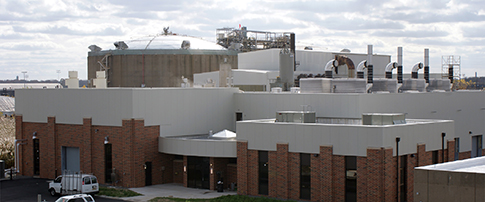
Game Changer: Our Biogas Cogeneration facility at the Northeast WPCP in Port Richmond is changing the way people think about wastewater management. Credit: Philadelphia Water.
The American Society of Civil Engineers rolled out a cool new campaign last week to highlight infrastructure projects around the country that they see as “game changers”—investments that have the potential to change the way we live for the better.
Making their list of innovative infrastructure was our very own Northeast Water Pollution Control Plant, a high-tech facility that treats an average of 188.12 million gallons of wastewater per day.
Located in the city’s Port Richmond neighborhood, the 150-acre Northeast WPCP facility is our biggest and oldest wastewater treatment plant. So why is ASME calling it a “game changer”?
The Northeast WPCP is home to our Biogas Cogeneration facility, a modern marvel that essentially turns a harmful human waste byproduct—methane gas— into enough energy to power about 85 percent of the plant’s operations.
In cruder terms: it’s power from poop.
This infrastructure investment has a number of benefits, not least of which is a reduced operating cost, which helps to keep rates low for our customers. Considering energy consumption is by far one of the biggest expenses in water treatment, creating that much energy for our biggest wastewater plant is a big deal.
From a more altruistic perspective, the Biogas Cogeneration facility also acts as a double-edge sword in fighting climate change; we’re keeping a powerful greenhouse gas out of the atmosphere while simultaneously reducing the need for fossil fuel-sourced electricity.
That makes the facility a win-win-win scenario.
The ASCE also lauds our biosolids recycling program and efforts to replace aging pipes and water mains:
"… they have increased investment in water pipes by 25 percent in their latest capital improvement program. However the Department’s Strategic Energy Plan also looks to better manage future expenses – it includes a facility that will extract energy from material typically thought of as waste. … Their ultimate goal for all of the wastewater treatment plants in the City is to be net zero energy consumption."
You can check out the full story and other innovation success stories at ASCEGameChangers.org.
Learn more about our sustainability initiatives here and get an overview of how the Biogas facility works here.